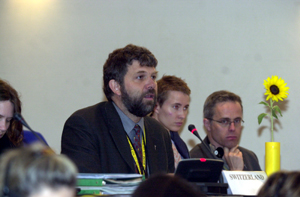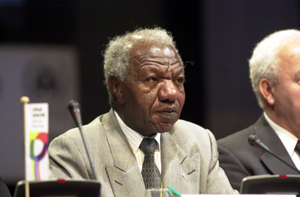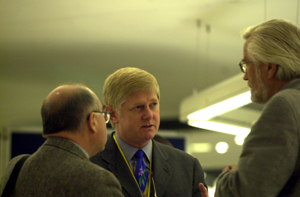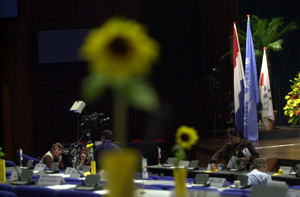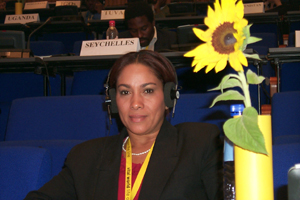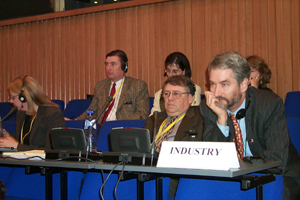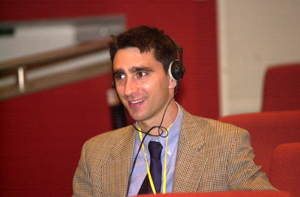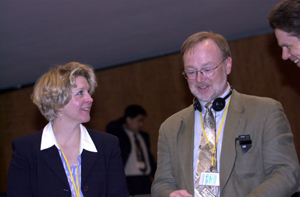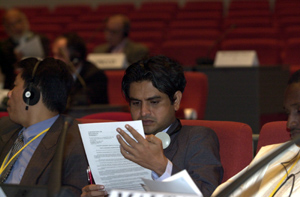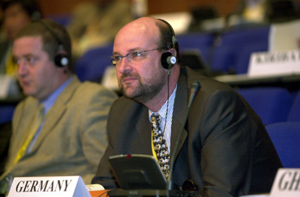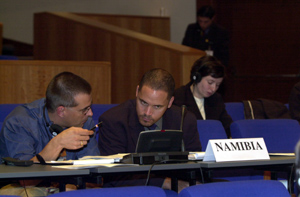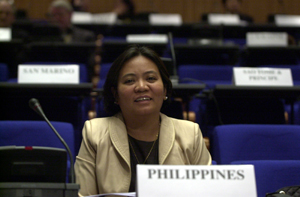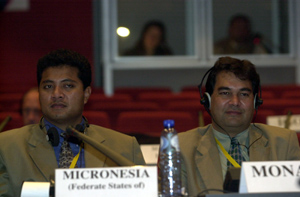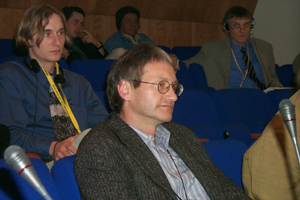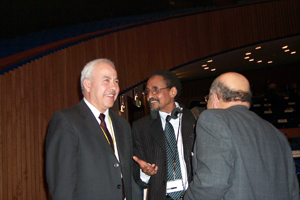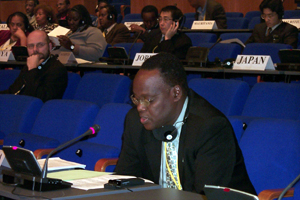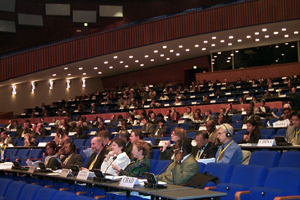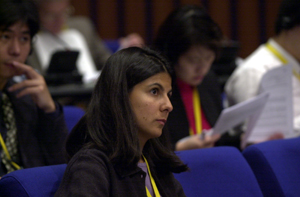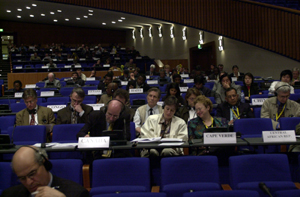|
||||||||||||||||||
|
Highlights
for Friday 26 April 2002 CLOSING PLENARY: 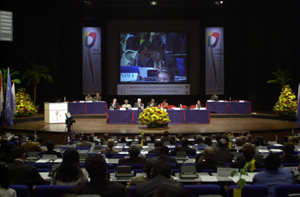 On
Friday, ICCP Chair Yang opened the closing Plenary with consideration of
other matters. He highlighted the recent 17th ratification of the Protocol
by Bolivia. Presenting the results of a survey on the status of
ratification, he said that out of 82 responses: 5 countries indicated that
they had ratified but not yet deposited their instrument; 22 intended to
ratify before the WSSD; 21 planned ratification before the end of 2002;
and 5 planned to ratify before April 2003. He stressed the possible
Protocol's entry into force before the end of 2002, and that MOP-1 may
be held in 2003. The Plenary adopted a recommendation on the Protocol's
entry into force (UNEP/CBD/ICCP/3/L.4), with minor amendments. The
recommendation calls upon Parties to ratify the Protocol and to provide
financial resources for preparatory inter-sessional meetings. On
Friday, ICCP Chair Yang opened the closing Plenary with consideration of
other matters. He highlighted the recent 17th ratification of the Protocol
by Bolivia. Presenting the results of a survey on the status of
ratification, he said that out of 82 responses: 5 countries indicated that
they had ratified but not yet deposited their instrument; 22 intended to
ratify before the WSSD; 21 planned ratification before the end of 2002;
and 5 planned to ratify before April 2003. He stressed the possible
Protocol's entry into force before the end of 2002, and that MOP-1 may
be held in 2003. The Plenary adopted a recommendation on the Protocol's
entry into force (UNEP/CBD/ICCP/3/L.4), with minor amendments. The
recommendation calls upon Parties to ratify the Protocol and to provide
financial resources for preparatory inter-sessional meetings. |
||||||||||||||||||
|
|
||||||||||||||||||
|
|
||||||||||||||||||
|
|
||||||||||||||||||
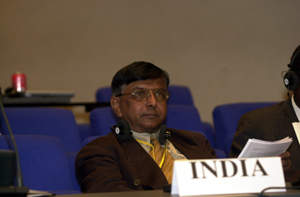 Chair Ghosh introduced WG-II's report (UNEP/CBD/ICCP/3/L.13). After debates, the Plenary added a paragraph reflecting statements by some delegates regarding ICCP-2's report on elements under discussion on compliance, and adopted the report with minor amendments. |
||||||||||||||||||
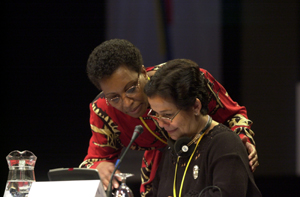 Antonietta Gutiérrez Rosati (Peru)(seated right) presented the meeting's report (UNEP/CBD/ICCP/3/L.1). India and Japan requested full record of their statements made during the meeting. Brazil, on behalf of GRULAC, requested record of a statement with regard to liability and redress, and capacity building. Spain, on behalf of the EU, noted disappointment with slowness of progress and stressed that they do not necessarily endorse or support the recommendations or the Chair's summary on Article 18.2. |
||||||||||||||||||
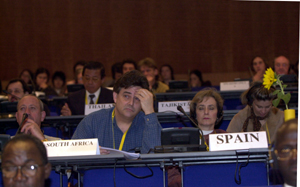 Spain, on behalf of the EU, noted disappointment with slowness of progress and stressed that they do not necessarily endorse or support the recommendations or the Chair's summary on Article 18.2. |
||||||||||||||||||
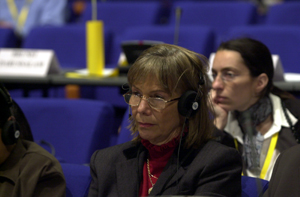 Argentina, on behalf of Argentina, Brazil, Chile and Uruguay, recorded that measures as contained in Annex II of the decision on compliance exceed the mandate stemming the Protocol and would not encourage the participation of developing countries in the initial stages of the Protocol's functioning. |
||||||||||||||||||
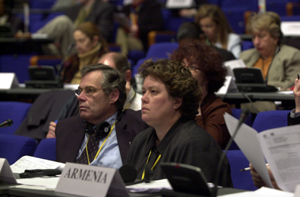 Australia said that technical activities by importers and exporters are the solutions needed and urged importing countries to set their domestic legislation, further noting that information requirements would not protect the environment but would hinder trade in LMOs and increase costs in all markets. With these additions and other minor amendments, the report was adopted. |
||||||||||||||||||
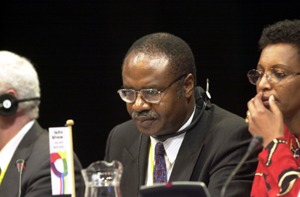 Chair Yang (right) then introduced UNEP/CBD/ICCP/3/L.3, a tribute to the government and people of the Netherlands, which was adopted. Chair Yang highlighted the achievements of the ICCP process, particularly in the areas of information sharing and capacity building, and with others thanked the participants, working group and contact group chairs, the Secretariat, support staff, interpreters and the government and people of the Netherlands. |
||||||||||||||||||
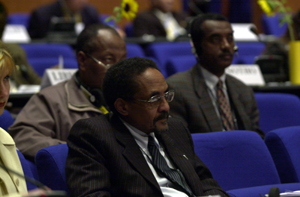 Under
other matters, Ethiopia (left) presented a resolution by the African Group
regarding information gathering activities by the Secretariat on the genetic
contamination of centers of origin and diversity. Several countries noted a
lack of time to consider the proposal, which was then included in the
meeting's report. Brazil on behalf of GRULAC, Egypt on behalf the African
Group, Grenada on behalf of SIDS, Iran on behalf of the Asia and Pacific
Group, Spain on behalf of the EU, Ethiopia, India, New Zealand and
Switzerland made closing statements. Dutch NGOs noted public support for
testing and labeling of LMOs, and expressed concerns about the economic
interests underlying the promotion of biotechnology. Greenpeace presented
flowers to those countries having ratified or acceded to the Protocol. Under
other matters, Ethiopia (left) presented a resolution by the African Group
regarding information gathering activities by the Secretariat on the genetic
contamination of centers of origin and diversity. Several countries noted a
lack of time to consider the proposal, which was then included in the
meeting's report. Brazil on behalf of GRULAC, Egypt on behalf the African
Group, Grenada on behalf of SIDS, Iran on behalf of the Asia and Pacific
Group, Spain on behalf of the EU, Ethiopia, India, New Zealand and
Switzerland made closing statements. Dutch NGOs noted public support for
testing and labeling of LMOs, and expressed concerns about the economic
interests underlying the promotion of biotechnology. Greenpeace presented
flowers to those countries having ratified or acceded to the Protocol. |
||||||||||||||||||
|
|
||||||||||||||||||
|
|
||||||||||||||||||
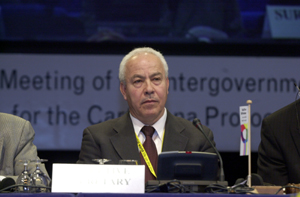 CBD Executive Secretary Hamdallah Zedan stated that the ICCP had laid the groundwork for the MOP and, highlighting the pace of ratifications, expressed optimism about the Protocol's entry into force. ICCP Chair Yang officially adjourned the meeting at approximately 2:00 pm. |
||||||||||||||||||
| ENB Snapshots: | ||||||||||||||||||
|
|
||||||||||||||||||
|
|
||||||||||||||||||
|
|
||||||||||||||||||
|
|
||||||||||||||||||
|
|
||||||||||||||||||
|
Links: The
CBD home page COP-6
Provisional Agenda |PDF|WORD| |
|
|
|| Back to Linkages home || Visit
IISDnet || Send
e-mail to ENB ||
©
2002, IISD. All rights reserved.

